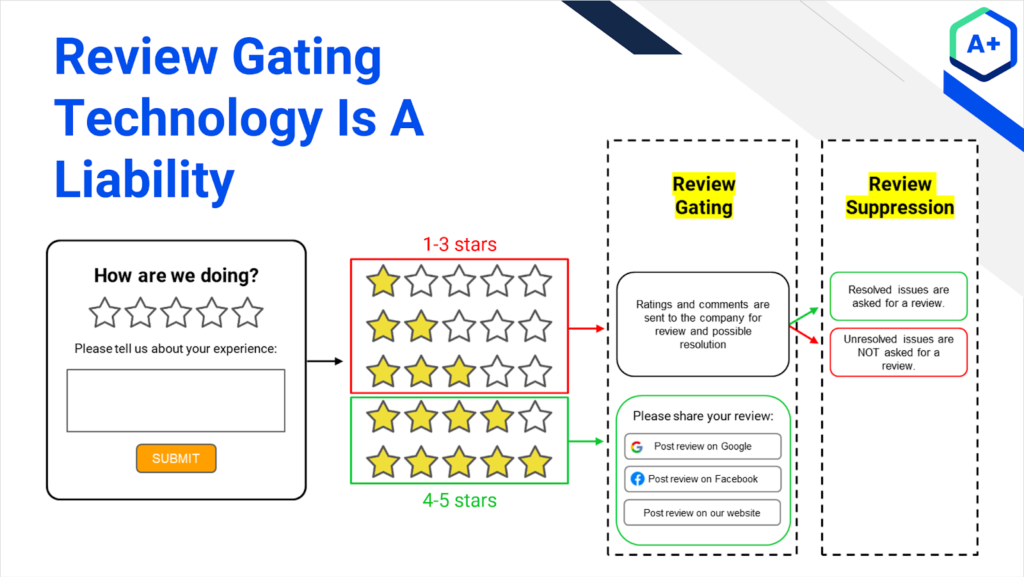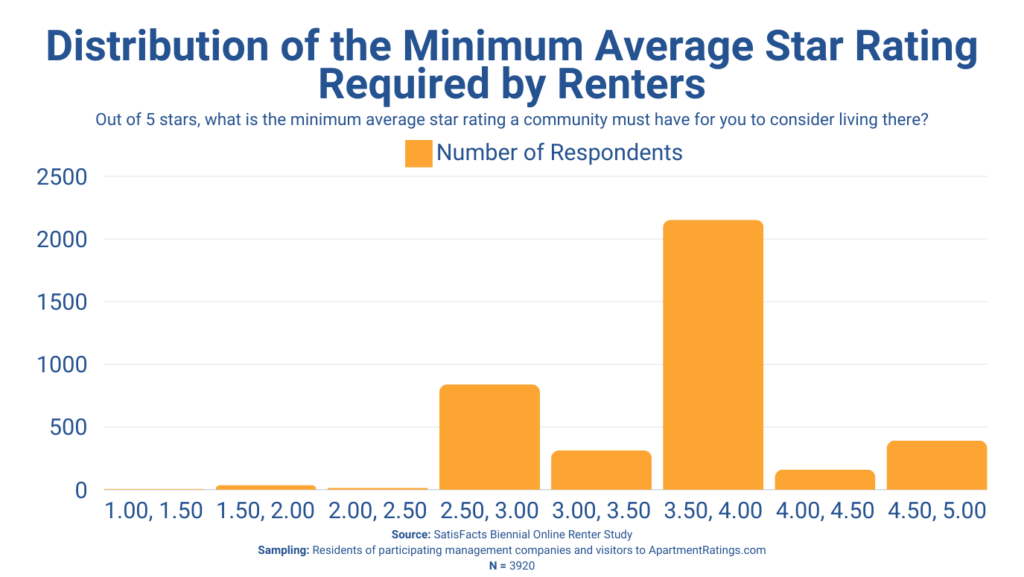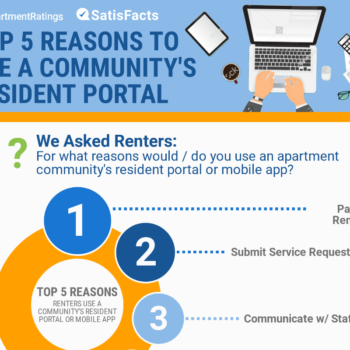In today’s digital age, online reviews have become a vital source of information for individuals seeking an apartment. In fact, according to the most recent SatisFacts Biennial Online Renter Study, 76% of renters researched their community’s online reviews prior to making first contact. These reviews serve as a window into the experiences of current and former residents, providing prospective renters with valuable insights before making a housing decision. However, the unethical practice of review gating has emerged as a growing concern, distorting renters’ perceptions of service quality and fostering a disconnect between expectations and reality. This article sheds light on the math behind review gating, its negative implications, and the subsequent erosion of customer trust and satisfaction.
The Math Behind Review Gating
Today, many technologies and strategies are used to effectively gate or suppress select reviews from being shown online while promoting others. To understand the impact of review gating, let’s examine one possible scenario and its effect on consumers. Let us consider a community with 300 units, where 100 ratings and reviews were collected over six months.
- 60 one-star ratings
- 5 two-star ratings
- 3 three-star ratings
- 6 four-star ratings
- 26 five-star ratings
In this scenario, review gating would selectively post only the positive ratings, 4 and 5-star scores, to online review sources (Google, Yelp, ApartmentRatings, etc.). On the other hand, the remaining lower ratings and any feedback provided are channeled internally, shielding them from public view.
The Outcome
Positive: 32 online reviews
Negative: 68 negative experiences invisible to prospective renters
Of the possible 100% of authentic reviews that could have been shared publicly, the practice of review gating, as provided by this example, only allows for 32% of their renters’ authentic voices to be shared.
It is important to note that these calculations are based on an illustration of how review gating can selectively control the visibility of reviews, skewing the overall perception of a community’s reputation.
Unveiling The Unethical Implications
Review gating, while seemingly innocuous on the surface, bears significant ethical concerns. By actively suppressing negative feedback, management companies engage in a disingenuous practice that misrepresents the true nature of their existing service level. This practice effectively creates a false-positive feedback loop, promoting an inflated and inaccurate perception of customer satisfaction.

The Chasm Between Expectations & Reality
In the latest Online Renter Study, renters were asked about the minimum average star rating that would prompt them to consider living in an apartment community. The findings revealed an average star rating of 3.82, signaling the desire for a blend of positive feedback and constructive criticism and indicating that renters appreciate an authentic portrayal of the community’s strengths and weaknesses. They value transparency and authenticity in online reviews, actively seeking out both positive and negative feedback to gain a holistic understanding of the community.
The accompanying distribution table illustrates a concentrated range of minimum star ratings falling between 3.5 and 4.0. This concentration reflects a pragmatic approach by renters, valuing a comprehensive view that acknowledges both the positive attributes and areas for improvement within a community. It suggests that renters recognize no community is flawless and prioritize a balanced representation of resident experiences to inform their decisions.

For the minimal 15% of respondents seeking a four-star or higher rating, it is noteworthy to emphasize the importance of having the capacity to meet or exceed those higher standards to ensure resident satisfaction. When these expectations are not met with real-life experience, renters will be left dissatisfied.
Review gating leads to a disconnect between that expectation of service and the actual experience after moving into a community. Individuals are lured into renting apartments based on an incomplete and biased community representation. This discrepancy between expectations and reality can have profound consequences, including high resident turnover rates and decreased referrals. According to the SatisFacts Online Renter Study, referrals have dropped 20% over the last ten years.
When residents’ experiences do not align with the rosy picture painted by selectively displayed ratings and reviews, dissatisfaction and disappointment can quickly set in. Frustrated by unmet expectations, renters may decide to refrain from renewing their leases, exacerbating turnover rates within the community. In fact, it is not uncommon for the multifamily industry to witness residents citing inadequate service experiences as a primary reason for not renewing their leases.
Domino Effect of Review Gating
When review gating is employed, negative feedback is suppressed, creating a domino effect that has far-reaching consequences. This approach not only hides critical feedback from the public eye but also puts pressure on management companies to address a growing list of concerns raised by residents. When resident concerns are ignored or left unaddressed, it will likely have a significant negative impact in many areas throughout the organization: deterioration of trust and satisfaction from customers, employee disengagement, and management exposure to liability.
Creating a Disconnect
When negative feedback is suppressed through review gating, a disconnect is formed between residents and management. As negative reviews and feedback accumulate internally, overwhelmed site teams who may already be understaffed or lack support find themselves unable to effectively address the growing number of concerns. This leads to frustration and dissatisfaction among residents, exacerbating the disconnect and straining the relationship between both parties.
Impact on Employee Turnover
Suppressing negative feedback not only affects residents but also has a significant impact on the site team’s morale and employee turnover. Overwhelmed and unsupported site teams experience a decline in confidence and job satisfaction. Overwork and lack of engagement lead to decreased motivation and diminished ability to provide exceptional service. This further perpetuates the cycle of negative feedback.
Legal Consequences
The consequences of disregarding negative feedback go beyond resident dissatisfaction. Failure to address genuine concerns can result in investigations and other legal consequences for management. If concerns are left unresolved for extended periods, local authorities may intervene, increasing the liability faced by management. This highlights the potential legal ramifications that arise from suppressing authentic feedback and failing to address resident issues adequately.
In January 2022, the Federal Trade Commission (FTC) took action against review management platforms that engage in review gating practices. The FTC issued warnings to ten such platforms and imposed a fine of $4.2 million. This move signifies the FTC’s determination to crack down on brands and platforms that manipulate reviews.
Additionally, the FTC and several states filed a lawsuit against rental listing platform Roomster and its owners for deceiving prospective renters with fake reviews and fraudulent listings. As part of the legal action, a proposed order was filed, which would require a seller of fake reviews to pay $100,000 and cooperate in the case against Roomster.
The FTC continues to crack down on review gating and suppression with new proposed rules, highlighting regulatory bodies’ growing scrutiny and enforcement efforts to combat review manipulation and ensure the authenticity and reliability of consumer reviews. The FTC’s stance sends a strong message to companies and platforms that engage in deceptive practices related to online reviews (including apps that filter negative reviews on websites and intercept negative feedback), emphasizing the need for transparency, honesty, and fair practices in managing and presenting customer feedback.
Embrace Transparency & Build Trust
Review gating in the multifamily industry has significant ethical and financial implications and, if not closely monitored, can lead to a distorted perception of service quality and a disconnect between renters’ expectations and their actual experiences. By selectively suppressing negative feedback, management companies create false-positive feedback loops, misalign business objectives, increase liability, and hinder the needs of both customers and employees.
To address these challenges, management companies must adopt a different approach. Instead of relying solely on the latest review-gating technology, they should prioritize using a comprehensive survey program that allows operators to evaluate service levels internally. By collecting actionable data and feedback directly from customers (residents and employees), management gains valuable insights that inform improvement plans and facilitate quality service delivery.
Furthermore, promoting online reviews should be delayed until management companies are confident that they deliver adequate service and support to their renters. Systematically rushing to promote reviews without addressing underlying issues can lead to the negative consequences outlined above.
At SatisFacts and Apartment Ratings, we advocate for authenticity, trustworthiness, and a genuine online reputation. We provide tools to enhance service delivery, earning honest ratings and reviews. By utilizing organizational listening tools like Insite by SatisFacts and prioritizing transparency and integrity, management companies in the multifamily industry can simultaneously address residents’ concerns, identify areas for improvement, and establish a foundation of trust and satisfaction. This proactive approach provides a more accurate representation of service quality, enhances the renter experience, and fosters a positive reputation within the industry. By employing internal evaluation surveys, delaying the promotion of online reviews, and consistently delivering exceptional service, management companies can align their business objectives with meeting the needs of both renters and employees. This holistic approach builds trust, cultivates resident satisfaction, and ultimately contributes to long-term success.
Say no to review gating and yes to services like our surveys, education and reputation management platform. Build a reputation that withstands scrutiny, endears you to your employees and residents, and stands the test of time. After all, in the digital era, genuine connections and honest experiences are what resonate the most.



